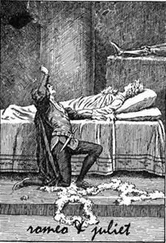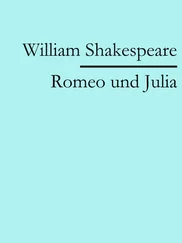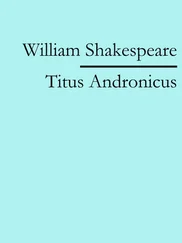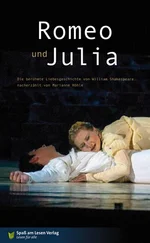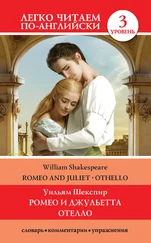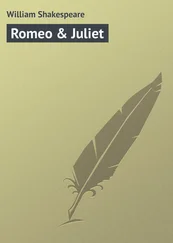Of my dug and felt it bitter, pretty fool,
To see it tetchy and fall out wi’ th’ dug!
Shake, quoth the dovehouse! ’Twas no need, I trow,
To bid me trudge.
And since that time it is eleven years.
For then she could stand high-lone. Nay, by th’rood,
She could have run and waddled all about.
For even the day before she broke her brow.
And then my husband – God be with his soul!
’A was a merry man – took up the child.
“Yea,” quoth he, “dost thou fall upon thy face?
Thou wilt fall backward when thou hast more wit.
Wilt thou not, Jule?” And, by my holidam,
The pretty wretch left crying and said “Ay”.
To see now how a jest shall come about!
I warrant, an I should live a thousand years,
I never should forget it. “Wilt thou not, Jule?” quoth he,
And, pretty fool, it stinted and said “Ay”.
LADY CAPULET. Enough of this. I pray thee hold thy peace.
NURSE. Yes, madam. Yet I cannot choose but laugh
To think it should leave crying and say “Ay”.
And yet, I warrant, it had upon it brow
A bump as big as a young cockerel’s stone,
A perilous knock. And it cried bitterly.
“Yea,” quoth my husband, “fallest upon thy face?
Thou wilt fall backward when thou comest to age.
Wilt thou not, Jule?” It stinted, and said “Ay”.
JULIET. And stint thou too, I pray thee, Nurse, say I.
NURSE. Peace, I have done. God mark thee to his grace!
Thou wast the prettiest babe that e’er I nursed.
An I might live to see thee married once,
I have my wish.
LADY CAPULET. Marry, that “marry” is the very theme
I came to talk of. Tell me, daughter Juliet,
How stands your dispositions to be married?
JULIET. It is an honour that I dream not of.
NURSE. An honour! Were not I thine only nurse,
I would say thou hadst sucked wisdom from thy teat.
LADY CAPULET. Well, think of marriage now. Younger than you
Here in Verona, ladies of esteem,
Are made already mothers. By my count,
I was your mother much upon these years
That you are now a maid. Thus then in brief:
The valiant Paris seeks you for his love. 46
NURSE. A man, young lady! Lady, such a man
As all the world – why, he’s a man of wax.
LADY CAPULET. Verona’s summer hath not such a flower.
NURSE. Nay, he’s a flower; in faith, a very flower.
LADY CAPULET. What say you? Can you love the gentleman?
This night you shall behold him at our feast.
Read o’er the volume of young Paris’ face,
And find delight writ there with beauty’s pen.
Examine every married lineament,
And see how one another lends content.
And what obscured in this fair volume lies
Find written in the margent of his eyes.
This precious book of love, this unbound lover,
To beautify him only lacks a cover. 47
The fish lives in the sea, and ’tis much pride
For fair without the fair within to hide. 48
That book in many’s eyes doth share the glory,
That in gold clasps locks in the golden story.
So shall you share all that he doth possess,
By having him making yourself no less.
NURSE. No less? Nay, bigger! Women grow by men.
LADY CAPULET. Speak briefly, can you like of Paris’ love?
JULIET. I’ll look to like, if looking liking move. 49
But no more deep will I endart mine eye
Than your consent gives strength to make it fly.
(Enter Servingman.)
SERVINGMAN. Madam, the guests are come, supper served up, you called, my young lady asked for, the Nurse cursed in the pantry, and everything in extremity. I must hence to wait. I beseech you follow straight. 50
LADY CAPULET. We follow thee.
(Exit Servingman.)
Juliet, the County stays.
NURSE. Go, girl, seek happy nights to happy days.
(Exeunt.)
Scene 4
Without Capulet’s house.
Enter Romeo, Mercutio, Benvolio, with five or six other maskers, and torchbearers.
ROMEO. What, shall this speech 51be spoke for our excuse?
Or shall we on without apology?
BENVOLIO. The date is out of such prolixity. 52
We’ll have no Cupid hoodwinked with a scarf,
Bearing a Tartar’s painted bow of lath,
Scaring the ladies like a crowkeeper, 53
Nor no without-book prologue, faintly spoke
After the prompter, for our entrance. 54
But, let them measure us by what they will,
We’ll measure them a measure and be gone.
ROMEO. Give me a torch. I am not for this ambling. 55
Being but heavy, I will bear the light.
MERCUTIO. Nay, gentle Romeo, we must have you dance.
ROMEO. Not I, believe me. You have dancing shoes
With nimble soles. I have a soul 56of lead
So stakes me to the ground I cannot move.
MERCUTIO. You are a lover. Borrow Cupid’s wings
And soar with them above a common bound.
ROMEO. I am too sore empiercèd with his shaft
To soar with his light feathers; and so bound
I cannot bound a pitch above dull woe.
Under love’s heavy burden do I sink.
MERCUTIO. And, to sink in it, should you burden love –
Too great oppression for a tender thing. 57
ROMEO. Is love a tender thing? It is too rough,
Too rude, too boisterous, and it pricks like thorn.
MERCUTIO. If love be rough with you, be rough with love.
Prick love for pricking, and you beat love down.
Give me a case to put my visage in.
A visor for a visor! What care I
What curious eye doth quote deformities?
Here are the beetle brows shall blush for me. 58
BENVOLIO. Come, knock and enter; and no sooner in
But every man betake him to his legs.
ROMEO. A torch for me! Let wantons light of heart
Tickle the senseless rushes 59with their heels.
For I am proverbed with a grandsire phrase –
I’ll be a candle-holder and look on;
The game was ne’er so fair, and I am done. 60
MERCUTIO. Tut, dun’s the mouse, the constable’s own word!
If thou art Dun, we’ll draw thee from the mire 61
Of – save your reverence – love, wherein thou stickest
Up to the ears. Come, we burn daylight, ho!
ROMEO. Nay, that’s not so.
MERCUTIO. I mean, sir, in delay
We waste our lights in vain, like lights by day.
Take our good meaning, for our judgement sits
Five times in that ere once in our five wits.
ROMEO. And we mean well in going to this masque,
But ’tis no wit to go.
MERCUTIO. Why, may one ask?
ROMEO. I dreamt a dream tonight.
MERCUTIO. And so did I.
ROMEO. Well, what was yours?
MERCUTIO. That dreamers often lie.
ROMEO. In bed asleep, while they do dream things true. 62
MERCUTIO. O, then I see Queen Mab hath been with you.
She is the fairies’ midwife, 63and she comes
In shape no bigger than an agate stone
On the forefinger of an alderman,
Drawn with a team of little atomies
Over men’s noses as they lie asleep.
Her chariot is an empty hazelnut,
Made by the joiner squirrel or old grub,
Time out o’mind the fairies’ coachmakers.
Her waggon-spokes made of long spinners’ legs;
The cover, of the wings of grasshoppers;
Her traces, of the smallest spider web;
Her collars, of the moonshine’s watery 64beams;
Her whip, of cricket’s bone; the lash, of film;
Her waggoner, a small grey-coated gnat,
Not half so big as a round little worm
Pricked from the lazy finger of a maid. 65
And in this state she gallops night by night
Through lovers’ brains, and then they dream of love;
O’er courtiers’ knees, that dream on curtsies straight;
O’er lawyers’ fingers, who straight dream on fees;
Читать дальше

